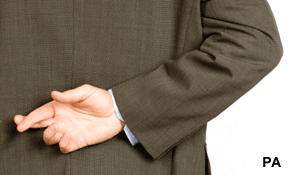65% feel that Britons have become less honest, while 15% admit to lying at workplace in last month
Most Britons believe that over the last decade, the nation has become more dishonest, with 4 out of 5 believing ‘personal gain’ will generally beat ‘honesty and integrity’ in what’s most important to people. Just over 1 in 4 claim there is no different in honesty since the year 2000, our poll shows.
- 65% think people in Britain have become more dishonest over the past decade
- 27% think there has been no different in honesty while 2% say Brits are actually more honest nowadays
- When it comes to what’s most important to people, 79% of the public think that Britons are more likely to feel that ‘personal gain’ is more important, while only 1 in 10 say people are more likely to be concerned with integrity and honesty
When considering their own actions in their professional life over the past month:
- 50% of Britons claim that they haven’t told a lie in the past month during the course of their work, 15% claim they have, 9% are unsure
- Of those who say that they have lied, 59% said they did not feel guilty for doing so, while 37% did feel guilty after being dishonest
The results come after scientists at the University of Essex conducted a study on ethics prior to launching Britain's first Centre for the Study of Integrity.
Author of the report, Professor Paul Whiteley, believes that there may be an 'integrity crisis' on the horizon, which may hinder British identity as well as social and political development. 'It appears Britons are growing more and more tolerant of low-level dishonesty and less inclined to sanction activities which would have been heavily frowned on in the past,' he said.
Journalist Alexander Chancellor, however, has said he feels that the University report included tests that people were likely to fail, and doubts that there is a general moral decline of integrity among British people.
'They may feel more relaxed than they once were about telling fibs, avoiding taxes and breaking the speed limit, if only because they see their leaders doing such things,' said Chancellor, who went on to defend the public. 'They continue to draw the line at behaviour that inflicts harm or distress on others', he said.
See the survey details and full results here (page 11)









